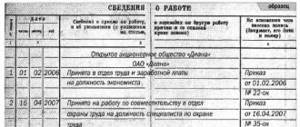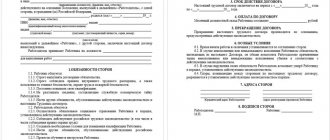It's good when the name doesn't change entirely. For example, another word or number is added.
It would be good if the slogan changed. But if the name changes radically, this is a rather serious step. You need to be prepared for it. You may lose a large number of clients , because probably not everyone will recognize the old company in the new name.
also be necessary to change all kinds of documents , starting with the constituent documents of the company and ending with reporting documentation. also need to make changes to the employee’s work book . In our article we will talk about exactly how changes are made in the work book, and we will also look at how exactly this entry is made by an employee of the HR department.
Why does an organization need to change its name?
Article 1473 of the Civil Code of the Russian Federation prescribes in paragraph 3 of each organization operating in Russia to have a name. This official name is included in the statutory documents.
But sometimes there is a need to change the official name of the enterprise. Here are the most common reasons for moving towards a new company name and amending the charter:
- merger of two or more enterprises together to form a new legal entity;
- separation of a subsidiary from the enterprise as a new legal entity;
- change in the form of ownership of an enterprise (for example, reorganization of an OJSC/PJSC into a CJSC);
- the desire of the owner of the enterprise to replace the name with a more euphonious one.
Whatever the reason for the renaming, first of all, the new name must be secured by entering it into the Unified State Register of Legal Entities and the company's charter. Only after this the new name can be used as an official one.
Note that changing the name is a complex and time-consuming process, since changes must be made to almost all company documents. Personnel documents, including the work book, must also reflect the fact of the name change.
Which wording is more correct: “the employee is fired” or “the employment contract is terminated”?
In 2006, Art. 84.1, which regulates the general procedure for formalizing the termination of an employment contract. The norm, which directly concerns the entry on the basis and reason for termination of an employment contract, reads as follows: “The entry in the work book about the basis and reason for termination of the employment contract must be made in strict accordance with the wording of this Code or other federal law and with reference to the relevant article , part of an article, paragraph of an article of this Code or other federal law.”
At the same time, Resolution of the Ministry of Labor No. 69 obliges to make an entry in the work book about the grounds for termination of the employment contract with reference to the corresponding paragraph of the article of the Labor Code of the Russian Federation. The document provides examples of how this is done: “Dismissed by agreement of the parties, paragraph 1 of Article 77 of the Labor Code of the Russian Federation” or “Dismissed at his own request, paragraph 3 of Article 77 of the Labor Code of the Russian Federation.”
A contradiction arises. What is the right thing to do?
It is necessary to be guided by the norms of a higher act. In this case, it is the Labor Code. The use of the norms of the Ministry of Labor Resolution No. 69 will be regarded as a violation of federal law.
According to Evgenia Konyukhova, a leading expert consultant on labor legislation and personnel records management, if we assume that the Labor Code is higher in legal force than the Resolution of the Ministry of Labor, then it is more correct to use the wording “the employment contract is terminated”, “the employment contract is terminated”.
It is important to understand the difference between these two terms - “terminated” and “discontinued”.
“Termination” presupposes the lack of initiative of both the employee and the employer (that is, the circumstances have developed - for example, the term of the employment contract has expired). The term “termination” is used when there is an initiative of one of the parties. In Art. 78 of the Labor Code of the Russian Federation specifies the procedure for terminating an employment contract.
When registering the dismissal of an employee on the initiative of the employee, reference should be made to Art. 77 of the Labor Code of the Russian Federation, which uses the term “termination of an employment contract”. In paragraph 15 of the Decree of the Government of the Russian Federation No. 225 there is an explanation on this matter: “When an employment contract is terminated on the grounds provided for in Art. 77 of the Labor Code of the Russian Federation (except for cases of termination of an employment contract at the initiative of the employer and due to circumstances beyond the will of the parties (clauses 4 and 10 of this article), an entry about dismissal (termination of the employment contract) is made in the work book with reference to the corresponding paragraph of part one the said article."
When dismissing an employee, all entries made in the work book during work for a particular employer must be certified by the signature of the employer or the person responsible for maintaining work books, the seal, and the signature of the employee.
Don't miss new publications
Subscribe to our newsletter and we will help you understand the legal requirements, tell you what to do in controversial situations, and teach you how to earn more.
Source of the article: https://kontur.ru/articles/5380
On what basis can a note be made in the work book?
Instructions for filling out work books dated October 10, 2003 No. 69 require personnel service employees to enter the full name of the enterprise into it. If the company has an abbreviated name, it must also be entered in the book.
The Instruction recognizes the indication of only an abbreviated form without the full name as unacceptable.
Therefore, after the enterprise has gone through the procedure of changing the official name, in the work book of each employee, the personnel department employee must indicate with a special entry the fact of renaming and the new full (and, if necessary, also abbreviated) name.
The instructions require that after each entry in the work book there is a link to an article of the Labor Code of the Russian Federation or another document that serves as the legal basis for making this entry. In the case of renaming, such a basic document is an internal act where the decision to rename is recorded. It could be:
- decision of the meeting of shareholders;
- order of the board of directors;
- another document of similar purpose.
Also see “Rules for filling out work books in 2021.”
What does such a change entail?
Changing your name entails many different types of actions . They are associated with changes in papers that are somehow important for the organization.
Changing the name of an organization entails a change of name in banking structures and tax authorities.
Now also the documents of employees that are in personal files and in which there is a mention of the organization must also be subject to change.
Various types of entries are made in the work book. They relate to hiring and dismissal, as well as rewards, reprimands, and so on. The issue of changing the name of the organization did not pass over the labor worker .
It is on the employment form that, first of all, a new name must be entered so that upon dismissal the employee does not have questions about why he went to work in an organization with one name and with one registered legal entity, but, judging by the writing, leaves a completely different organization.
How to make an entry about renaming in a work book
With regard to the preparation of this record, the same requirements apply as dictated by the Instructions regarding other records:
- legible handwriting;
- only blue, purple or black ink;
- absence of strikethroughs, blots and shading (as well as text proofreading).
Enter a sample entry in the work book about renaming the organization with a new line after the last of the available entries in the 3rd column. In this case, columns with date and number (1st and 2nd) do not need to be filled out .
The content of the entry should reflect the essence of the renaming that occurred.
EXAMPLE 1
A sample may look like this: “Closed Joint Stock Company “Meteor” was renamed Closed Joint Stock Company “Meteor-M” from 09/01/2018 due to amendments to the charter documents.” Next, in the 4th column indicate the basis. For example, a link to an order to change the name.
EXAMPLE 2
Not all employees can make a record: if Alpha LLC absorbs Omega LLC, then the renaming record is made by Omega employees, but Alpha employees do not need to make a record.
The following shows a sample entry in a work book about renaming an organization:
| Entry no. | date | Information about hiring, transfer to another permanent job, qualifications, dismissal (indicating reasons and reference to the article, clause of the law) | Name, date and number of the document on the basis of which the entry was made | ||
| number | month | year | |||
| 1 | 2 | 3 | 4 | ||
| Closed Joint Stock Company "Internet-Guru" (CJSC "Internet-Guru") | |||||
| 1 | 19 | 04 | 2016 | Recruited to the accounting department as a junior accountant | Order dated April 19, 2016 No. 19/16-p |
| Closed Joint Stock Company "Internet-Guru" (CJSC "Internet-Guru") was renamed Closed Joint-Stock Company "Guru-PK" (CJSC "Guru-PK") from September 25, 2018 | Minutes of the General Meeting of Shareholders dated September 18, 2018 No. 2 | ||||
Also see “Renaming a position without changing the job function: how to register.”
Read also
17.01.2019
Filling out a work book: basic rules
Recently, the Ministry of Labor submitted to the government a bill that envisages a complete transition to the electronic format of work books from 2021.
But for now, let’s look at the rules for maintaining ordinary paperwork. How to make notes, are layoffs permissible, what is the difference between the terms “termination” and “termination” of an employment contract? The organization of work on maintaining work books begins with the appointment of someone responsible for this work. In paragraph 45 of the Government of the Russian Federation of April 16, 2003 No. 225, it is clarified that responsibility for organizing the work of maintaining, storing, recording and issuing work books and inserts in them rests with the employer represented by the general director. He must, by order, drawn up in any form, appoint a specially authorized person. At the same time, it is important to indicate in the order who will keep work books in the absence of an authorized person. Some employers resort to the wording that if such a situation arises, an additional responsible person will be appointed by a separate order of the employer. But one order is not enough. Otherwise, such an action will conflict with Art. 4 of the Labor Code of the Russian Federation, prohibiting forced labor.
HR specialists are required to maintain work records in their job description. But often this functionality is entrusted to the chief accountant, office manager - those whose labor functions are not related to maintaining work books. To do this legally, in addition to the order, you must draw up an additional agreement to the employment contract or additionally make changes to the job description.
The second important issue related to work books concerns the acquisition of forms. Often, the employee himself brings the work book form to the employer. However, the employer cannot take such a form. According to clause 44 of the Decree of the Government of the Russian Federation of April 16, 2003 No. 225, the employer is obliged to constantly have in stock the required number of work book forms and inserts in it. He can purchase these forms directly from the manufacturer or from official distributors.
The employer is also responsible for keeping track of work books, as well as work book forms and inserts in it. For this purpose, he must keep a receipt and expenditure book for recording the forms of the work book and the inserts in it, and in addition - a book for recording the movement of work books and inserts in them. The most important thing is to entrust the work to those who should do it.
For example, an employer often makes the mistake of delegating the maintenance of the income and expense book to the human resources department rather than the accounting department. But the HR department or the person responsible for maintaining labor books should be responsible for keeping track of all work books and inserts in them in the book of accounting for the movement of work books.
In paragraph 41 of the Government of the Russian Federation of April 16, 2003 No. 225, it is specified that the receipt and expenditure book for recording the forms of the work book and the insert in it and the book for recording the movement of work books and inserts in them must be numbered, laced, certified by the signature of the head of the organization, and also sealed with a wax seal.
Filling out the title page
The initial page is required to display all information about the accepted identity, based on the materials provided. All inscriptions are entered without abbreviations.
The TC contains the following inscriptions:
- Full name of the owner.
- Date of birth.
- Availability of education.
- Name of specialty according to diploma.
- TC registration date.
- Owner's signature.
- Signature of the personnel officer who filled out the document.
- Seal of the institution.
Sample of filling out the title page in 2021.
For a more complete study of this topic, you can watch the video.
How to fill out a document in different cases: samples
There are five basic rules for filling out the TC:
- All entries must be completed in legible handwriting.
- The inscription on the form is in the official language of the country.
- The inscriptions are made in blue or black ink, or in extreme cases, violet.
- Numbers are written only in Arabic.
- Errors, cross-outs, erases and other blots are prohibited.
What does this mean for employees?
According to clause 66 of the Labor Code of the Russian Federation, a work book is one of the main documents of any worker. The work book is important because it, like a counter, records the entire length of service. If, after the organization changed its name, records related to this event were incorrectly made or they were missed altogether, this will lead to confusion and a reduction in length of service. This problem will have to be solved with the help of certificates and archival documents confirming the “imaginary” experience.
Any error in the work record must be corrected immediately at the current or new place of work. If a mistake was made during the existence of the organization before the reorganization, then it is necessary to demand its correction from the legal successors of the company. If a legal entity has been subject to liquidation, then the correction of errors must be carried out by authorized persons at the new place of work.
Changed job title
The company decided to change the names of a number of positions without changing the job function, how to formalize this correctly? translation? What is considered the basis for transfer? Or is it better to take personal statements as employees?
The organization decided to rename the positions
Why should an employee write a statement? And most importantly - about what?
This is a job title change.
1) Order on the main activity “on making changes to the staffing table”:
“In connection with. I ORDER: 1. Rename the position “.” " V ". ". 2. make changes to employee credentials.
2) Additional agreement to TD on changing the name
3) Order for personnel to change the name of the position occupied by specific employees
4) Recording a name change in the book
Question: In a limited liability company, a decision was made to bring the names of employees’ positions in accordance with the qualification directories. At the same time, the labor responsibilities of employees remain the same, no technological changes are being made, and the organizational structure changes only in terms of job titles. Is Art. 74 Labor Code of the Russian Federation? Is it mandatory to conclude additional agreements to employment contracts with employees on changing the job title?
Answer: To bring the names of employees' positions into compliance with the qualification directories, it is necessary to draw up an additional agreement in accordance with Art. 72 of the Labor Code of the Russian Federation and obtain the consent of employees. The title of the position is the employee’s labor function, therefore the procedure provided for in Art. 74 of the Labor Code of the Russian Federation, does not apply.
Rationale: The employee’s labor function is a mandatory condition of the employment contract (Article 57 of the Labor Code of the Russian Federation). As a general rule, it is not allowed to change an employee’s job function without his consent. Currently, the Labor Code of the Russian Federation does not clearly regulate the issue of what constitutes a change in the labor function. The Presidium of the Supreme Court of the Russian Federation, in Resolution No. 12ПВ11 dated 06/08/2011, explained that the claim for reinstatement at work, recovery of wages for forced absence, moral damages was legally denied, since the plaintiff’s job function was not changed, she was asked to continue working in another structural unit in the same specialty and qualifications. That is, in this case, the change in the scope of work did not entail a change in the employee’s labor function. However, the Resolution of the Supreme Court of the Russian Federation does not determine whether a change in position is a change in the labor function. The definition of labor function is enshrined in Art. 15 of the Labor Code of the Russian Federation and includes: - work according to the position in accordance with the staffing table; - profession; - speciality; — qualifications; - specific type of assigned work. Therefore, in accordance with the Labor Code of the Russian Federation, the position should be considered as a labor function of the employee. Consequently, a change in position, including in the form of a position title, is allowed only with the consent of the employee, since this entails a change in his job function. Article 74 of the Labor Code of the Russian Federation implies a change in the terms of the employment contract determined by the parties for reasons related to changes in organizational or technological working conditions, and does not allow changes in the employee’s labor function. Based on the fact that the position is part of the labor function, a change in the name of the position entails a change in the labor function, therefore a change in working conditions under Art. 74 of the Labor Code of the Russian Federation is unacceptable. Based on Art. 72 of the Labor Code of the Russian Federation, changes in the terms of the employment contract determined by the parties, including transfer to another job, are allowed only by agreement of the parties to the employment contract, with the exception of cases provided for by the Labor Code of the Russian Federation. An agreement to change the terms of an employment contract determined by the parties is concluded in writing. Based on Art. 72.1 of the Labor Code of the Russian Federation, transfer to another job is a permanent or temporary change in the labor function of an employee and (or) the structural unit in which he works (if the structural unit was specified in the employment contract), while continuing to work for the same employer, as well as transfer to another job to another location with the employer. Transfer to another job is permitted only with the written consent of the employee, except for the cases provided for in Parts 2 and 3 of Art. 72.2 Labor Code of the Russian Federation. Thus, we can conclude that when changing a position, including its name, the written consent of the employee is required. Based on the above, dismissal under clause 7, part 1, art. 77 of the Labor Code of the Russian Federation is unacceptable.
O. A. Shevchenko Moscow State Law Academy named after O. E. Kutafin 10/04/2012
www.superjob.ru










